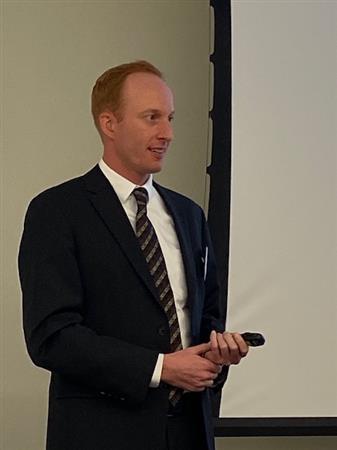
Local Seward Rotarian, Anthony M. Aerts, Esq. of the local, Seward law firm, Rembolt Ludtke LLP, presented the program at the weekly Seward Rotary Club meeting on Wednesday, Dec. 2nd, 2019 at the Jones Bank auditorium at a noon luncheon. Fellowship, lunch and a short business meeting preceded the featured program.
Local Seward Rotarian, Anthony M. Aerts, Esq. of the local, Seward law firm, Rembolt Ludtke LLP, presented the program at the weekly Seward Rotary Club meeting on Wednesday, Dec. 2nd, 2019 at the Jones Bank auditorium at a noon luncheon. Fellowship, lunch and a short business meeting preceded the featured program.
He presented a power point slide show titled “Estate Planning and Charitable Giving” and first presented four ways to conceptualize the idea that estate planning: control, privacy, lower taxes/costs, and putting “First Things First”- as each person should assign an individual as an agent to act on their behalf for financial and healthcare matter through a General Durable Power of Attorney and Health Care Power of Attorney. He also stressed that the paper work needs to be in place for the appointment of a Guardian for any minors in a family.
Aerts pointed out that everyone has an estate plan, even with no will, as the State of Nebraska has a written plan and laws in place that will distribute funds if no other plan, arrangement or will exists.
It was also addressed that charitable giving can be accomplished either through lifetime gifts, after death through a person’s estate plans, or both, and it really depends on each person’s situation, goals, and individual circumstances.
Various tools can be used to accomplish estate planning and charitable giving in Nebraska including a a simple will or living revocable Trust. He explained that certain assets are considered on-probate assets that can be disposed of according to beneficiary designations, including Life Insurance, Retirement Accounts, POD Bank Accounts and Joint Tenancy/TOD Real Estate.
He commented on the Nebraska Inheritance Tax rates and commented on the costs involved in preparing a will/estate plan-stressing that it is a very individualized effort, and so many factors play into the costs charged towards having a plan prepared based on time and complexity.
Aerts discussed options for avoiding probate, a technically public court process, which in turn can help to safeguard a person’s privacy and save time and money.
It was pointed out the changes in Federal Estate and Gift Tax laws raised the exemption amount each person can shield from federal estate tax in 2019 to $11.4 million. He reminded the group that through the annual gift tax exclusion, each person can gift any other person in the world up to $15,000.00 without gift tax consequences.
The new tax laws also nearly doubled the standard deduction to $12,200 for a single individual and $24,400 for a couple. A taxpayer can generally take the standard deduction or itemized deductions. In order to deduct for charitable donations, a taxpayer must itemize deductions but due to the new higher threshold, many just take the standard deduction making it harder to receive a deduction for charitable gifts. He stressed one option for avoiding this outcome is “Bunching”, where you group charitable giving into “on and off” years to increase the total amount of charitable deductions in the “on” years to exceed the standard deduction. Aerts also discussed the option of Donor Advised Funds-DAF- where you make the donation and take the deduction in a single year, but then work with the Fund to direct the funds for certain charitable programs over multiple years.
Questions and answers followed and Aerts reminded and encouraged the Rotarians to have a current estate plan, and to work with a trusted professional, who can offer a plan for organized estate and charitable giving. He invited the Rotarians to visit with him and shared he can be contacted by calling the Rembolt Ludtke LLP office in Seward or by emailing him at aaerts@remboltlawfirm.com.